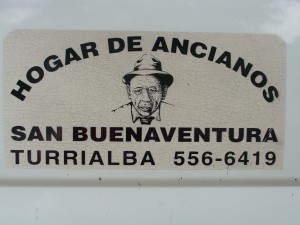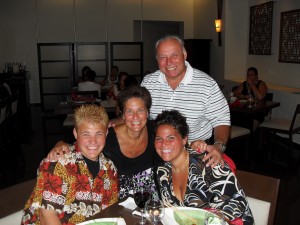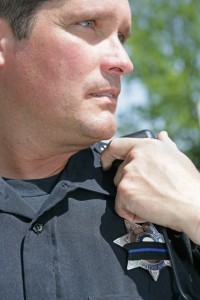Hogar De Ancianos San Buenaventura, Turrialba, Costa Rica, Central America

My wife, Rose, and I recently visited the county nursing home in Turrialba, Costa Rica. We lived in Turrialba for a year in 2003-2004 to study Spanish and to learn a different culture, and our lives have been forever changed and broadened by that experience. We now feel at home in this Spanish-speaking land. We love being here surrounded by tropical birds, coffee plantations, and sugar cane fields.
This trip we wanted to learn about the local county nursing home, so we asked our friend and Spanish teacher, Olivia to ask permission to visit. Yesterday we visited what is literally called “Home for the Ancient Ones”—Hogar de Ancianos. We like it that Costa Ricans are not troubled by our North American political correctness filter. They often call me “Gordo” which means chubby… oh well! If someone has green eyes they are called “Gato” or “Gatica,” which means cat or kitten. But back to my story.
Olivia was our guide and we were accompanied by the assistant to the administrator, Benigne Solono Trejos, a living example of caring and compassion. The facility is nestled into the volcanic mountainside of Turrialba and has a panoramic view of the now-active Turrialba Volcano and the widespread green of the valley below. There were tropical flowers everywhere upon the grounds of the Hogar. The windows and doors of the residents’ rooms were wide open to admit the warm sunshine and gentle breezes. It can be cold here, but the average temperature year round is a lovely life-giving 75 degrees F.

Costa Rica is the wealthiest country in Central America, but it is not rich by Western European or North American standards. The facility may lack much of the equipment that is taken for granted in the USA, but the most important resources are present in abundance—loving and compassionate caregivers and administrators. The facility smells of flowers and cleanliness! I inspected every room and they were clean, clean, clean!
Our administrative hostess, Sr. Solono, has worked at the facility for 16 years and has sacrificed to stay at the Hogar and provide care for “the Old Ones.” She considers every aged resident a part of her family. At every room, it was obvious that the residents feel respected and valued. They live in a place of dignity.
Most of the residents sat outside in the open air. It was a beautiful day! The buildings are designed with rooftops with large overhangs to create a front porch-terrace effect. Those who were able could walk around, pet the dog, and volunteer to help in the laundry or do other small chores. After all, everyone of every age wants to feel useful.
There are about 70 full-time residents at the home. Surprisingly, there are far more men than women. If you have visited a nursing home in the U.S. you know that there are very few men, since women typically outlive men by many years. I asked how it could be that there were more men than women. I was told that in Costa Rica, families try to keep the old ones at home and that women are able to provide more help with child care, cooking, and cleaning than men. My wife said, “See I told you that you men are harder to take care of!”
The question of paying for long term care was my next enquiry. Sr. Solono told us that the central and local governments provide only a bit of support. In fact, just like in the U.S., government may give with one hand but take with the other. In Costa Rica, the government keeps raising the standards of care but provides no money to accomplish those goals. Amazingly, one of the biggest sources of funding for the Hogar is a lottery which is conducted on an as-needed basis. (The Hogar must receive a governmental permit to sell lottery tickets within the county that they serve.) In addition, they own a fairgrounds where they conduct an annual fair as a fundraiser. Fundraising is a constant concern and activity of the administration and many volunteers.
As we visited many residents, we were cheerfully greeted by those who were able. I fell in love with Eva, an octogenarian who happily spoke excellent English. Her career was as an assistant in the international center of agriculture called Catie. She shares a room with her sister, who is confined to a wheelchair and sat quietly until she spied my bare legs sticking out below my walking shorts. She is the first woman in my life to become excited upon seeing my legs! She chortled and in Spanish she told me that I had chubby legs. Olivia, our Spanish teacher, said that she was flirting with me. My wife stated flatly, “You should be so lucky!”
I want to thank Sr. Solono Trejos and the entire team at the Hogar de Ancianos San Buenaventura. You are doing a great job as you serve seniors and those who love them!

 How do you think you would feel if you could not remember a time that your father or mother did not have memory issues? John Remaly was only nine years old when his dad was diagnosed with Young Onset Alzheimers. He and his sister Alyssa have grown up adjusting to the gradual loss of their dad’s memory and ability to care for himself.
I spoke to John and his mom, Melinda, and asked them to share with me some of the trials and victories that they have experienced during the last few years. John told me that in his family, they have worked together to provide a united front to withstand Alzheimers’ attack on their family happiness. “Most people, when dealing with something like this, start to fight and blame each other. We have decided to use our gift of humor to find creative ways to work with my dad.” He went on to share with me that his father, Rick Remaly, has always been a guy who loves the quick one-liner jokes and over-the-top comedy. He says that the family enjoys shows like Will and Grace, Everybody Loves Raymond, and Family Guy. John and his sister Alyssa love theater and acting, and they have memorized sketches from the different shows, complete with script, dialogue, jokes, and timing. This helps keep their father engaged and laughing. John quickly added, “Dad can still catch ‘quick humor’ and he is very easily amused. In fact, one evening when he was feeling low, I decided that he and I should have a little fun and put calcium tablets in our mouths. Do you know what happens when you put calcium tablets in your mouth? It doesn’t hurt you, but you foam like a rabid dog! Dad and I could not stop laughing.”
Melinda added that life at home is not always humorous and that John has had to take on the role of being an adult and a caregiver for his father. She admires the way John works with his father. Rick seems to take direction better from John than anyone else. “When you’re dealing with Alzheimers, you need to work together as a family and be open to sharing with loved ones and co-workers. You need to be truthful in keeping people informed about the real situation at home.” She went on to say that it’s very important to be able to go out with friends and to have support systems. In fact, one of the key principles in helping the Remalys stay emotionally healthy is recognizing that from time to time, you have to get away from the caregiving at home.
The Remaly family is about to embark on a new phase of life. John Remaly has applied to, and been accepted at, Bradley University in Peoria, Illinois. His dad and mom will be losing one of the pillars that support being able to provide for Rick at home. John wrote a college admissions essay in October 2009 which detailed his experiences in growing up with Alzheimers. The entire text is available by clicking on this link: John Remaly’s College Admissions Essay
In both October 2008 and October 2009, Melinda Remaly organized a group to participate in the Alzheimers walk in Libertyville, Illinois called “On the Move for Alzheimers.” Each year the family, friends, and John’s friends from school walked together to raise funds for Alzheimers research. All the friends and family members wore t-shirts that said. “Walk for Rick.” On the back of Mr. Remaly’s t-shirt it said, “I am Rick.”
We here at Law Elder Law are grateful that the Remaly family has chosen us to be their legal advocates.
How do you think you would feel if you could not remember a time that your father or mother did not have memory issues? John Remaly was only nine years old when his dad was diagnosed with Young Onset Alzheimers. He and his sister Alyssa have grown up adjusting to the gradual loss of their dad’s memory and ability to care for himself.
I spoke to John and his mom, Melinda, and asked them to share with me some of the trials and victories that they have experienced during the last few years. John told me that in his family, they have worked together to provide a united front to withstand Alzheimers’ attack on their family happiness. “Most people, when dealing with something like this, start to fight and blame each other. We have decided to use our gift of humor to find creative ways to work with my dad.” He went on to share with me that his father, Rick Remaly, has always been a guy who loves the quick one-liner jokes and over-the-top comedy. He says that the family enjoys shows like Will and Grace, Everybody Loves Raymond, and Family Guy. John and his sister Alyssa love theater and acting, and they have memorized sketches from the different shows, complete with script, dialogue, jokes, and timing. This helps keep their father engaged and laughing. John quickly added, “Dad can still catch ‘quick humor’ and he is very easily amused. In fact, one evening when he was feeling low, I decided that he and I should have a little fun and put calcium tablets in our mouths. Do you know what happens when you put calcium tablets in your mouth? It doesn’t hurt you, but you foam like a rabid dog! Dad and I could not stop laughing.”
Melinda added that life at home is not always humorous and that John has had to take on the role of being an adult and a caregiver for his father. She admires the way John works with his father. Rick seems to take direction better from John than anyone else. “When you’re dealing with Alzheimers, you need to work together as a family and be open to sharing with loved ones and co-workers. You need to be truthful in keeping people informed about the real situation at home.” She went on to say that it’s very important to be able to go out with friends and to have support systems. In fact, one of the key principles in helping the Remalys stay emotionally healthy is recognizing that from time to time, you have to get away from the caregiving at home.
The Remaly family is about to embark on a new phase of life. John Remaly has applied to, and been accepted at, Bradley University in Peoria, Illinois. His dad and mom will be losing one of the pillars that support being able to provide for Rick at home. John wrote a college admissions essay in October 2009 which detailed his experiences in growing up with Alzheimers. The entire text is available by clicking on this link: John Remaly’s College Admissions Essay
In both October 2008 and October 2009, Melinda Remaly organized a group to participate in the Alzheimers walk in Libertyville, Illinois called “On the Move for Alzheimers.” Each year the family, friends, and John’s friends from school walked together to raise funds for Alzheimers research. All the friends and family members wore t-shirts that said. “Walk for Rick.” On the back of Mr. Remaly’s t-shirt it said, “I am Rick.”
We here at Law Elder Law are grateful that the Remaly family has chosen us to be their legal advocates.





